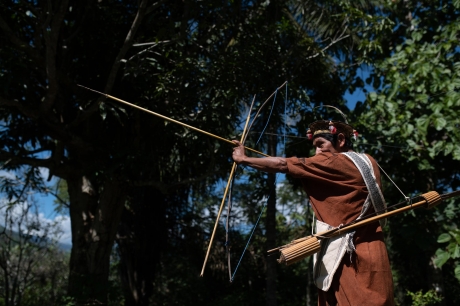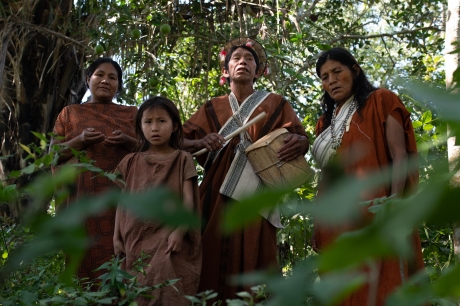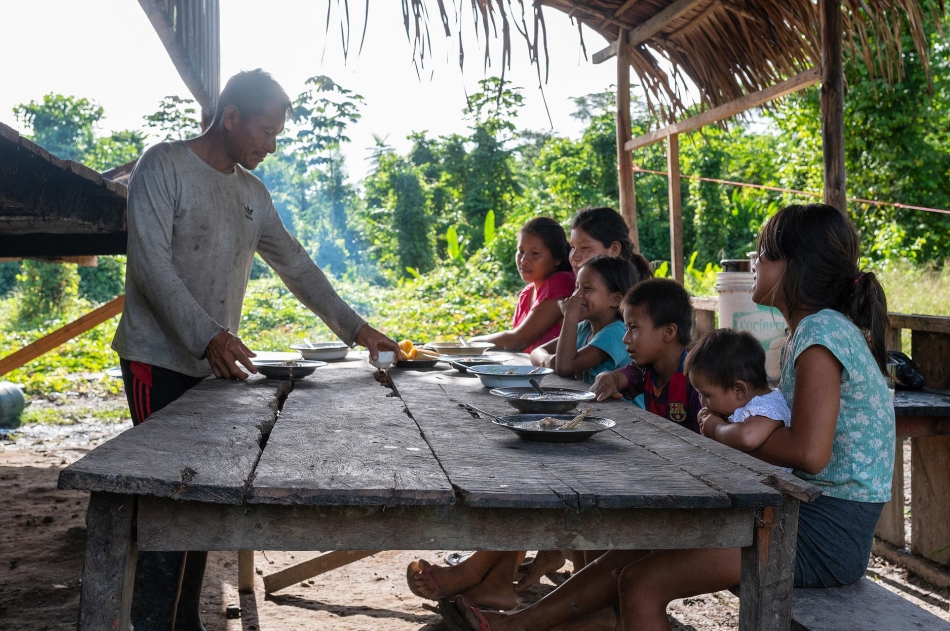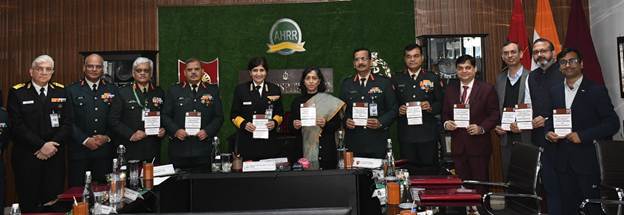
The Ashaninka Indigenous Peoples in Peru relied on “notsimancaque”, a term that signifies resilience, during years of conflict, and more recently, during the COVID-19 pandemic. ©FAO
In September 1991, Rosalinda Shamayre Elias heard explosions and screams in her community.
“Terrorists, terrorists!” she shouted.
Her people, the Ashaninkas, a group of Indigenous Peoples that has lived for thousands of years in the rainforests of Peru and Brazil, were being ambushed by the former terrorist group, Sendero Luminoso (The Shining Path).
That night a grenade was thrown at Rosalinda’s house. She ran away with her three children and remained hidden in the Mazamari forest for four months.
Rosa— as she’s fondly known— and Hector Luna Jacopo, her husband, not only lost their home but also dozens of family members and friends during the long years of conflict.

Even in the face of immense loss and heartache, Rosa and Hector found a way to persevere and heal. In the Ashaninka language, they describe this as notsimancaque, a term that signifies “resilience”, or more accurately, the ability to mend the soul and carry on for the betterment of the community.
Two decades later they found themselves again amidst fear, loss and uncertainty.
It was March 15, 2020, and the Peruvian authorities announced a lockdown due to the spread of the COVID-19 virus— at the time, a new and unknown illness.
Their community, called El Milagro, had a reason to be fearful. They had a health centre, but no doctors, medical supplies or medicines.
At first, the Ashaninka people took measures to protect themselves from the virus by closing off their territory to outsiders and isolating themselves. But as time wore on, the community found themselves struggling with hunger and dwindling supplies.

To address the growing food scarcity, they designated a group to venture out and trade for supplies. Unfortunately, it wasn’t long before COVID-19 began to infiltrate their community, and many fell ill.
“Many of our brothers and sisters got sick, and some didn’t make it,” Rosa and Hector recounted.
Regaining a lost opportunity
The pandemic also took from them what had recently become an opportunity to improve nutrition and livelihoods in the community. Back in 2018, local authorities had supported 18 families in El Milagro to install fish farms and raise fingerlings.
The Indigenous Peoples group hoped to improve and prevent children’s malnutrition, which in the Amazonian communities sometimes reaches up to 20.3 per cent, according to government figures.
The arrival of the pandemic abruptly ended the initiative.
As the health situation improved at the end of 2021, the Food and Agriculture Organization of the United Nations (FAO) with the support of the Government of Canada conducted rapid food and local market’s assessments to strengthen rural and agricultural community-based organizations.

The initiative aimed to improve nutrition and livelihoods while also focusing on empowering Indigenous Women and supporting gender-responsive public protection programmes.
FAO visited El Milagro, where the community expressed clearly the need of restarting and expanding the fish farming project the pandemic had taken from them.
Rosa assumed the leadership of this initiative. Her job was to coordinate workflows and promote the participation of more women to raise fingerlings.
“We learned how to prepare the fish feed, how to improve water circulation and how to organize ourselves better,” she explains, adding that the fish has also helped improve her people’s nutrition.
“I dream of a community where malnutrition is a thing of the past, and women can weave and laugh without fear,” she shares.
With the support of FAO and the Government of Canada, El Milagro and 42 other communities across the provinces of Atalaya in the region of Ucayali and Satipo were able to revive their fish farming and other agricultural projects, including growing crops like coffee and cocoa.
Women spearheading resilience
Rosa recognizes that empowering women is key to ensuring a better future for her children and the community.
Together with other women from her community, Rosa received weekly FAO training not only on better aquaculture techniques but also on leadership, women’s rights and human rights.
In addition to boosting productivity, these training sessions also focused on empowering the women of the community, many of whom live in extreme poverty, with some surviving on less than USD 1.90 per day, according to the International Labour Organization.
Rosa acknowledges that being a mother and a leader is complicated and that the main limitation for some women is obtaining the support of their husbands, which is thankfully not her situation.
From serving as the head of the community kitchen to taking on the role of treasurer on the community board, Rosa has been a capable and dynamic leader, and her husband supports her involvement. She would like to eventually lead El Milagro, and they work together to make that a reality.
Overall in 2022, as part of the ‘COVID-19 Response and Recovery Programme’, FAO and Canada supported over 23,000 smallholder farmers, especially youth and Indigenous Peoples in Peru, Bolivia, Nicaragua and Honduras.
On the verge of 60, Rosa’s resilience remains unwavering. Having endured the horrors of conflict, illness and poverty, she has learned to seize every opportunity that life presents her, including FAO’s initiative, to heal, to start over, and to notsimancaque.
Source: the FAO News and Media office, Rome
– global bihari bureau





